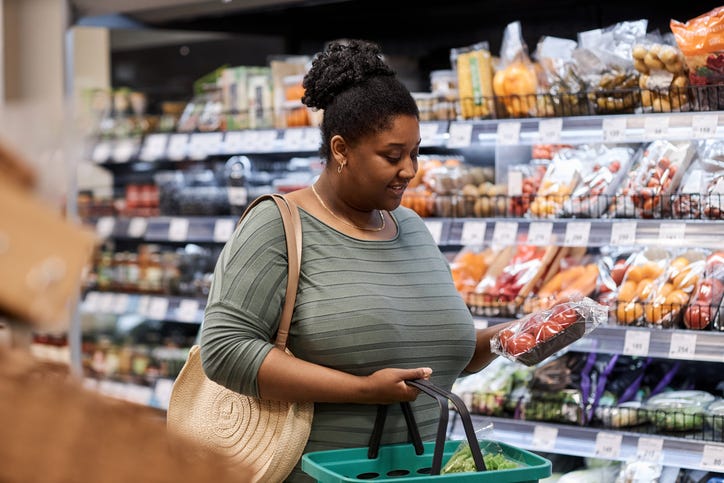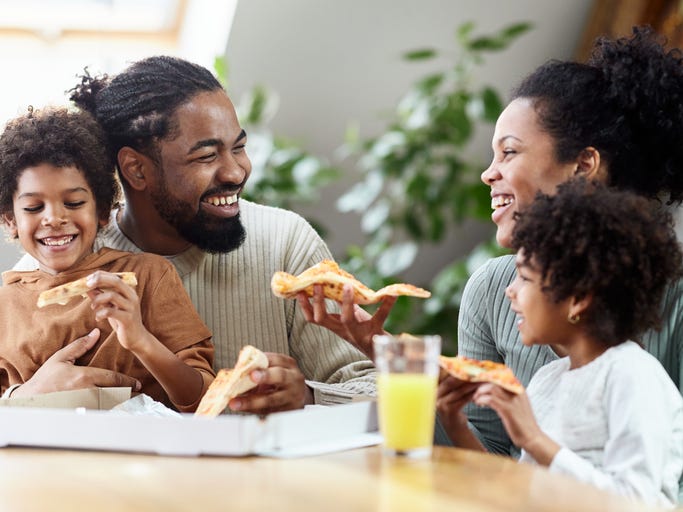You’re listening to Burnt Toast! This is the podcast where we talk about diet culture, anti-fat bias, parenting, and health. I’m Virginia Sole-Smith. I also write the Burnt Toast newsletter and I’m the author of Fat Talk.
Today I am chatting with the brilliant
Laura is a Registered Nutritionist who specializes in responsive feeding and anti-diet, body affirming nutrition. Her work centers on helping parents and families end inter-generation dieting and body shame, and work towards a greater sense of embodiment and ease in their relationship with food. She runs
and is the author of two books; Just Eat It and How to Just Eat It.1Laura did an awesome three part series on her Substack recently, and as soon as I read it, I knew I wanted to have her on the podcast to discuss. We recorded for approximately 100 hours because there is just so much to say about ultra processed foods! So we’re splitting this up into an exciting two parter.
Today Laura is giving us the big overview: What is an ultra-processed food? What does the research tell us about how UPFs impact our health or don’t? How should we be thinking about the current UPF discourse?
Next week, we’ll be getting into your nitty gritty questions about navigating UPFs in your own diet and family life.
PS. If you’re enjoying the podcast, make sure you’re following us (it’s free!) in your podcast player! We’re on Apple Podcasts, Spotify, Stitcher, and Pocket Casts! And while you’re there, please leave us a rating or review. (We like 5 stars!)
Episode 101 Transcript
Laura
I am a Registered nutritionist. I’m based in London, I did live in the States for a while, which is why I’ve got this super messed up accent. All your listeners will be like, where is she from? I grew up in Scotland, lived in the States, and now live in London.
I split my time between clinical work, which is focused on family nutrition—I do a lot of work around responsive feeding in kids who have feeding differences, working with families where they’re just stressed about mealtimes with their kids, and also helping parents sort through their own stuff with food and body image. And then I also run a Substack called
which takes up a lot of time, as I know you know.Virginia
Yes. So I basically begged you to come on the podcast to talk about your three part series about ultra processed foods. This is one of those topics I get so many questions about.
I’ve reported it out a little bit here and there. And I definitely feel, just as a person in the trenches feeding kids, that I have figured out my own values around this, which is helpful and we may get into talking about that. But I’m not a dietitian or nutritionist. I haven’t done a deep dive of the literature. So when I saw you were doing this series, I was like, thank you, Laura!
So everybody, your homework is to go read all three pieces and subscribe to
. But just as a starting point: Laura, what is an ultra processed food? And why is it so hard for us to agree on that definition?Laura
I don’t think we can talk about the definition of an ultra processed food without talking about the NOVA classification system. There are a few different classification systems that have attempted to try and nail down what exactly an ultra processed food is. But what has been most widely accepted in the literature and what we’re seeing a lot of the studies and the headlines coming out about now is something called the NOVA classification system that was developed in 2009 by this Brazilian dude called Carlos Monteiro. NOVA really annoyingly does not stand for anything, it’s not an acronym. That really fucks me up.
Carlos is nutrition researcher, he and his team came up with a system whereby he defines four different levels of food processing. So I’m going to walk you through the four different groups.
Group 1 is called “unprocessed foods.” This includes anything from a plant, an animal, or a fungus. So that could be fruits and vegetables. It’s eggs and meat. It can be grains, like oats or rice or wheat. It can be chilled or frozen fruits and vegetables without salt or oil added. Basically, it’s any raw ingredient that you could buy from the supermarket or that you could pull straight out of the ground or pick from a tree, that kind of thing.
Virginia
So, oats but not oatmeal or oat bars? Like, just the oats.
Laura
Exactly that, but that’s an important clarification.
Then within this unprocessed foods category, there’s this minimally processed subcategory, which are things that are pickled or fermented from those raw ingredients. So, that’s group one.
Virginia
I feel like they’re already finding weird loopholes that pickled things are part of group one, but okay, keep going.
Laura
Honestly, it’s a minefield.
Group 2 are processed culinary ingredients. So these are ingredients that are derived from group one. It can be oils, from like olives or sunflower. It can be salt, spices, herbs, lard, butter, honey, maple syrup, that kind of stuff. They’re kind of like extracts or derived from those group one, minimally processed or unprocessed foods.
Virginia
Got it.
Laura
Group 3, you can think of as group one plus group two, mixed together. And these are called processed foods. It can be anything from fresh bread that you buy at a bakery to cheese that has been fermented and goes through the whole conversion from milk into cheese.
But also, it includes virtually anything you make yourself at home or anything that you would buy in a restaurant, right? Because it’s taking those fresh ingredients, plus those culinary ingredients like salts and fats and sugars, and transforming them into what you and I would recognize as a meal.
So I think the point that I want people to understand is that the vast majority of the food that we’re eating, even if we’re cooking it by ourselves at home from ingredients that we’ve picked up at the farmers market or the periphery of the grocery store or whatever, unless we’ve gone and pulled a carrot out of the ground, it’s a processed food.
Virginia
Processed is just another way of saying cooked. Like, processed foods are meals.
Laura
Yeah. Pretty much, unless you’re eating a raw apple.
Virginia
As a meal.
Laura
It’s not even a snack. But if you’re dipping your apple in some peanut butter, that’s a processed food.
Virginia
Got it. Okay.
Laura
So then we get to Group 4, which is ultra processed foods. Now, they’ve tried to pin down a definition, but there are a lot of different criteria. And the bar for what constitutes an ultra processed food is actually really low. So in terms of a technical definition, an ultra processed food is a food that is derived from Group 1 foods. So for example, whey or casein protein that is taken from milk or gluten taken from whole wheat flour—these things would be considered an ultra processed food. So, an ultra processed food is something that contains ingredients derived from whole food products or contains additives that are intended to either imitate or enhance the sensory qualities of food. So, already it’s such a vague definition.
Virginia
Again… cooking.
Laura
Virtually anything that you would add to a food to make it taste better, those are part of the definition. Another part of the definition is the type of processing that a food has undergone. So things like hydrogenation, extrusion, molding, these are not things that we’re doing at home really, in our kitchen. So it’s essentially anything that is made in a factory, like cornflakes or Cheerios have to go through some sort of extrusion process. A granola bar has to go through like a molding process. So again, some of these common everyday foods are actually ultra processed foods.
The third criteria for what constitutes an ultra processed food is that it has to be a branded food product. That means that it comes in a package. It’s convenient. There’s little or minimal cooking and it is marketed somehow at you. Whether that’s through the packaging, whether that’s through a nutrition claim like a health halo type thing. The food manufacturers are doing what they can to try and get you to eat that food.

Virginia
Right. Okay.
Laura
So there is this really big vague definition which means that the bar for what actually counts as an ultra processed food is really low. You could argue, for example, that a natural peanut butter, which has been pulverized within an inch of its life, you could argue that that’s an ultra processed food.
Virginia
That’s funny, one of the reader questions was, “Is the smashed natural peanut butter better for me than Jif?” And what you’re saying is that they would likely be in the same category.
Laura
They would both be ultra processed foods.
So it can end up lumping really disparate foods together. So, like I said, Cheerios and supermarket bread that you might buy or bagels, or whatever it might be are alongside like Haribo. I’m trying to think of an American appropriate food.
Virginia
Cheetos. Flaming Hot Cheetos.
Laura
Yes, exactly.
Virginia
So that is really interesting because it does show all of the media conversations around ultra processed foods are trying to alert us to these threats, like this is this dangerous category of foods you need to be cutting out—which we can talk separately about, like, is that even a helpful strategy for nutrition? But that’s the goal is to fear-monger around all of these foods. And what you’re saying is: If you were really going to use the definition that they’ve laid out, you’d be cutting out like 75 percent of the grocery store.
Laura
Yeah, pretty much. And I think it’s interesting that you say that it’s creating a lot of fear and stress about the food and anxiety about the food that we’re eating, which I think is true. But one thing that I keep coming back to is that NOVA in and of itself wasn’t designed as a hierarchy. But we, in our twisted diet culture brains, have weaponized it as a hierarchy. Because if you think of it from a nutrition perspective, like I said, lard is in Group 2. White rice and white flour are in group one right now. I’m not saying that they’re a bad food, but I don’t think we would also argue that they’re like a health food. But they’re in Groups 1 and 2. So we’ve kind of manipulated it into a hierarchy, but that’s not necessarily what it means.
Virginia
It’s sort of like what we’ve done with growth charts, right? Like, growth charts are just meant to track what percentage point your kid is relative to their peers, like they’re bigger than 80 percent of kids or they’re only bigger than 20 percent of kids. And we attach all this meaning to what those points mean and where’s the good part of the growth chart to be.
Well, poor NOVA, I feel bad for Carlos that this work got distorted if that was not the intention.
Laura
I think he has a part to play in this because he really has pushed this agenda in Brazil. Now the NOVA classification is being used alongside or is sort of amalgamated into the dietary guidelines of Brazil, which I don’t I don’t think is a helpful move.
Virginia
It’s clear from the way you’ve explained the categories and which foods end up in which groups, but it feels important to say very clearly that ‘processed’ is not synonymous with ‘has no nutrition,’ and that actually processing foods is a good thing to do in order to eat, right?
Laura
All forms of cooking are process. So unless you want to go down some raw vegan path, you can’t really avoid processing your food to some extent. Now, advocates of NOVA I think would say that’s a bit of a red herring because what we’re actually talking about is this additional level of processing, this ultra processing phenomenon.
But even within that category, I think there are merits to processing, even ultra processing, our foods. One of the things that happens when we process food is we extend the shelf life of it. And that means that we are wasting less food overall which I think we would all agree is probably a helpful thing.
Industrial food processing also reduces foodborne pathogens. It reduces microbes that would spoil food and make it turn rancid faster.
It also significantly cuts down on the time and labor that it requires to cook a meal. And for me, as a parent, and I know for you as well, that’s huge.
Virginia
It’s really everything, honestly, for me personally. Limiting the amount of time I spend cooking dinner is the thing that enables me to eat dinner with my family at night.
Laura
But it’s not just super privileged white women that have a lot of nutrition knowledge who benefit from ultra processed foods. I’m also thinking about kids with feeding disorders that would struggle to get all the nutrition that they need without processed foods. I’m thinking about elderly or disabled people who can maintain a level of independence because they can quickly cook some pasta and throw an ultra processed jar of pasta sauce on that and have a nourishing meal. I’m thinking about pregnant people who otherwise might not be able to stomach eating because of morning sickness and nausea—which we know lasts forever, not just the morning.
There are so many groups of people that benefit from ultra processed foods and they just seem to be missing entirely from the conversation around these foods.
Virginia
So often there’s this message, “We have to just get poor people cooking more, get them cooking more.” But if you live in a shelter, you don’t have a kitchen. If you are crashing on a couch with family members, in a house with lots of different people and it’s not easy for you to get time in the kitchen. There are so many different scenarios where cooking is not a practical solution and having greater shelf stability is very important.
Laura
It also says a lot about where we place our values, right? And who is making decisions about where we put our values, because it’s not everyone’s value system to spend more time cooking from scratch, right? And buying fresh ingredients and spending more time in the kitchen.
There’s a line that Carlos Monteiro wrote in a scientific paper and I legitimately cannot understand how this passed peer review because it’s so much about judgment rather than objective scientific argument, where he basically is saying that ultra processed foods prevent families from eating together. And he talks about ultra processed foods as though they’re the undoing of family meals.

Virginia
Oh, Carlos. No, no, no, no, no.
Laura
And aside from the fact that for me, and I think for you, and probably a lot of people listening, ultra processed foods save family dinners.
Virginia
Literally how I’m achieving it. Literally how I’m getting it done.
Laura
But again, it’s like who’s determining how we should be eating and you know what our values are around food and eating?
Virginia
You have a great line in part two of the series:
My argument is not that we don’t need to change the food system. My argument is that the headlines have leapfrogged science, allowing people in places of power and privilege to create fear and shame about the food we eat. This keeps us focused on food as the issue, rather than the social, political, and structural forces that shape our lives and our experiences of wellbeing.
It just feels like exactly what we’re getting at here. We are letting this one set of values and this real laser focus on food as a moral concept get in the way of actually thinking about people’s lives.
Laura
Again, the conversation is just reducing our health and wellbeing down to how processed or otherwise our food is. To me it feels symptomatic of these much deeper sociocultural political problems that we’re facing and just a red herring for deeper structural issues that that need addressing.
This is not going to sound like a big number in American terms, but in the UK, in England alone, there’s something like 4 million food insecure children who just simply do not have enough food to eat in a cost of living crisis. I think public health nutrition should be focusing on universal free school meals for those kids and making sure that they have provisions in breakfast clubs and after school clubs, rather than quibbling over whether Weetabix or a can of baked beans is an ultra processed food.
Virginia
Another question that I get often is, “But what about the fact that these processed foods are being produced in ways that are really bad for the environment?” There are huge workers rights violations happening in the factories in the fields. These are human rights issues in terms of how these foods are getting made.
I was thinking about this yesterday. My 9-year-old who has a traumatic feeding history and is still a very cautious selective eater, one of her staples is Amy’s frozen bean and cheese burritos. It has to be the Amy’s brand. We cannot substitute brands. It has to be the bean and cheese. It cannot be a different flavor. These burritos are not inexpensive, but we put a good part of our grocery budget towards them because she will eat one every day and it’s a safe food and it’s covering a lot of nutritional bases for her. It’s a great meal for her.
But this whole thing that just came out about labor rights violations for Amy’s workers. A friend sent it to me and was like, “we’re so bummed, we’re gonna give up eating them.” Her wife also loves the burritos. She was not at all saying that Violet should, but I just thought, this is not a fair game. I should not have to be thinking, well now I’m buying a product that is contributing to the exploitation of people in order to feed my child lunch. Both of these things matter.
Laura
There is no ethical consumption under capitalism, right? The thing that I’ve come to recognize while researching and writing this piece is that there’s exploitation and domination at every single level of the food system, regardless of whether that food is ultra processed or not. Just confining that argument to ultra processed foods, I think, is missing the point because it’s the entirety of the food system, even if we were just eating corn straight off the cob.
Virginia
The people picking the corn are still being exploited.
Laura
This is the part that I found most disturbing and upsetting when I was writing was the human human rights violations. And I don’t have an answer to that. I don’t know how we reconcile that. This comes up a lot in
as well. How can we hold companies and businesses and systems accountable?Because what you’re saying is making it an individual responsibility. We need systemic change and we need systemic action. There are certainly things that I do that where I think, okay, this feels like a more ethical decision than this other decision. But we all have to make these compromises somewhere along the lines. And that’s not letting those companies off the hook. Since this piece published last month, I’ve had so many invitations from the food industry like, oh, come to this roundtable talk or this panel. I’m like, I’m not here to defend you.
My one bias in this whole thing is that I’m a nutritionist and I want people to be nourished. That’s my only bias. I am not a shill for the food industry. I’m not here to make you feel better about the shitty things that you’re doing. But I am here to relieve guilt and shame and stigma and judgment about the food choices that we’re making. The person that is eating this food is not responsible for the shitty practices and systems and policies in place.
Virginia
And the ability to participate in a boycott, to say “I’m going to shop differently and try to only support the most ethical brands I can,” involves a ton of privilege. That is not an option that’s available for me with my 9-year-old right now, because this is her lunch, and I’m not going to take away her lunch. But we try really hard to source ethical coffee because only my husband and I drink it and because we have the financial privilege to be super bougie about our coffee. But that’s not a solution to the fact that coffee workers are treated so terribly—it’s a drop in the bucket. It really does strike me as using a diet culture mindset to solve these problems.
Laura
Anytime there’s a binary, I get really skeptical. We can say, “I don’t feel great about buying this product and I’m going to write to my representatives,” or whatever you can do within the means that you have and within the resources that you have available to you.
Virginia
Yeah, that’s a great point. I think it is important to say that I’m not letting us all off the hook and I don’t think Laura is either. I’m not saying we can just sit back and let it all be terrible because my kid needs to get this burrito. I need to find out if there’s a workers rights fund for that company. Can I donate to their strike in some way? That I would love to do. We need to think more creatively about how we can show up on these issues and not just make it about “my grocery list needs to get a gold star on this.” Because we’re never going to achieve that.
I also want to drill in a little more on the nutrition piece of this. We’ve been talking about how this category is too broad. It’s super messy. You’ve got my pasta sauce and my Flaming Hot Cheetos all in there. But a lot of folks are going to say okay, but we can all clearly see that the Flaming Hot Cheetos are not nutrition and the pasta sauce is or whatever. I mean, maybe some people would also question my pasta sauce choice, I don’t know.
Would it be more useful to develop a fifth category? Does the system need to be more rigid and have a clear category of what we really mean when we talk about ultra processed foods? Or is that also not actually serving us to keep categorizing in this way?
Laura
I don’t think a fifth category would be helpful because I come back to the idea that this was never intended to be a personal project. This system of categorization in its original inception was designed to be a tool for public health and nutrition researchers to use to study patterns in the diet over time. When we’re not imbuing it with social meaning, I think there’s nothing inherently wrong with that. But I think it’s when we apply it to our personal lives it becomes this hierarchy where you say that we get a gold star if we only have foods from group one and two, which, as we just talked about, is virtually impossible. That’s where it becomes a problem. The evidence around ultra processed foods is not as clear cut as I think the headlines are reporting.
Virginia
Yes.
Laura
This is what I talked about in part two of my series. I spoke with
, who helped walk me through some of the problems with these big observational studies that we have around ultra processed foods.There’s been this explosion in the literature in the past five years around ultra processed foods where they are linking ultra processed foods to type two diabetes, to cardiovascular disease, to cancers, to all kinds of really terrifying, scary health outcomes. But even though I say there’s been an explosion in literature, there are actually very few meta-analyses, which is the top tier gold standard study to ratify some of these smaller observational studies. So that’s one problem.
Virginia
Another problem is the media reports on those small observational studies as if they are gold standard meta-analyses involving 5 million people. They’re not saying, “This is extremely new data and we haven’t replicated it very much.” They never give that framing. And that’s why we see the anxiety rise, because it’s all presented as if it’s equally valid data.
Laura
There’s a lot of hyperbole and there’s a lot of conjecture in the media reports that I’m seeing because we do have a couple of meta analyses, but they’re not exactly showing these huge effect sizes that we’re seeing in the reporting. The way that it’s been talked about in the reporting is kind of leapfrogging what the the findings of these studies are. So it’s not that there is no effect whatsoever with ultra processed food. I think it’s more about the magnitude of this effect where there’s a disconnect.
Virginia
Say more about that.
Laura
So, mostly, what you are seeing reported in these studies, is a relative risk. Let’s say for argument’s sake, Virginia, your diet is less than 25% ultra processed food and I’m in the 75% and up group. So I’m in the highest quarter, you’re in the lowest quarter. What these studies are saying—and I’m plucking these numbers out of thin air—is they they might say that my risk of whatever disease is 30% higher than yours. So that’s telling us about the relative risk between you and me. What it’s not telling us is our absolute risk. So if you’re, if you’re starting risk is 2% and mines is 30% more than 2%—I can’t even do that math. It is tiny.
Virginia
It hasn’t even doubled. We’re not even at 4%.
Laura
Exactly. So if we’re reporting the relative risk or the odds ratio, you don’t need to worry about that. But it means that picture is misconstrued as being much, much worse than it might actually be. So that’s one issue that we have with this science.
The second issue is that when we look at people in the 25% lowest intake of ultra processed food versus the 75% and higher intake, the people in those groups are different on virtually every single metric that we’re measuring them on. They’re different in terms of family history of things like cancer and heart disease and type two diabetes. They have different incomes, different education levels, they live in different housing, the safety of their neighborhoods is different. They’re just very, very different on virtually every other metric. So we can’t tease apart whether or not that increased relative risk is due to the food that they’re eating or some other variable that we haven’t adjusted for in our statistical modeling. That’s called a confounding or it’s a residual variable.
Virginia
So important.
Laura
That’s true of most big observational nutrition studies, not just in ultra processed foods. There are a lot of holes in nutritional research.
Virginia
Across the board.
Laura
I don’t think it’s wrong to say that if we have a diet high in fruit and vegetables and whole grains, that we will generally have better health outcomes. But it might also be because of some other factor that we’re not measuring. It is probably both. It’s probably partly the food that we’re eating, but also all these other variables like stress, social connection, income, education—all of these other things
Virginia
Access to health care.
Laura
Our experience of anti-fat bias and discrimination, of racism. All of these things are not accounted for in these studies.
Virginia
I think this is the thing that feels hardest to communicate, because when we’re talking about ultra processed foods—really, anytime there’s a food bad guy. When it’s carb fear, when it’s sugar fear, when it was fat, the conversation narrows down to talking about that one food in this very unhelpful way. And it’s hard to open the conversation back up. So I really appreciate you laying all that out.
This is a topic that comes up at dinners with extended family members. This is a topic that comes up in the doctor’s office where there is this immediate shaming, knee jerk reaction of “Oh, sure, intuitive eating sounds nice but you don’t mean you can just eat as much junk food as you want.” You know, “you don’t mean you can just eat processed foods.”
It’s just so important for all of us to hold, even if you can’t say it all in the moment, the science is not as set as people think on this. There are a lot of big questions that we have not answered. And we are drawing majorly speculative conclusions from this data.
Laura
And nutrition isn’t all or nothing. There’s space in our diets for ultra processed food and it doesn’t mean that we are suddenly not eating any fresh foods. That conversation gets tricky as well because there are also some people that have absolutely no choice but to eat ultra processed foods.
Again, my bias as a nutritionist is how can we make sure that they are getting all the nutrition they need from those ultra processed foods? There was a study that came out from some Australian researchers which found that if we were to remove ultra processed foods from the diet, because a high proportion of ultra processed foods are fortified with really important nutrients, essential nutrients, that we would actually be putting more people at risk of deficiency.
Virginia
That’s a great point.
Laura
Doctors are lumping all ultra processed foods together and doing a lot of hand wringing around them when in actual fact, that can be a really important source of nutrients for a lot of people.
Virginia
This is why we don’t have scurvy anymore, guys. It’s a good thing!
And I want to name very clearly the classism and the racism bound up in this. There’s a reason I’m drawing out Flaming Hot Cheetos as the example here, right? There’s a knee jerk assumption in public health and the larger discourse around this topic, that certain groups of people are only eating a certain category within the ultra processed foods category. And there’s no examination of A. if that’s even true? Because it’s most likely absolutely not true. And B. what factors might be creating the circumstances. Like, what is driving that? It’s not just people’s ignorance.
Laura
I think that this is the piece that public health nutrition seem to be missing. When I was researching this, I subjected myself to a lot of continuing professional development, webinars and seminars and things. I sat in on webinars by my colleagues going through ultra processed foods and talking about all of the things that are mentioned about the problems around classification, and how they’re an important source of nutrients for some people. There was this thread running through their conversations of we need to be really careful because people rely on ultra processed foods because they’re really busy. We’re really stressed in our lives and they’re convenient. And that’s where that thread stopped.
And I was like, Come on, let’s tug on that a bit more. Pull that thread a bit further. Why are people stressed? Why don’t they have time to cook? I mean, and setting aside that that’s not necessarily everyone’s values, right? But what is going on, what is driving this phenomenon? And we have to bring it back to late stage capitalism, the disillusion of community, hyper individuality, the fact that we have to sell our labor for eight, ten, twelve hours a day, that we don’t have the systems of care and community in place that we that we might otherwise have that help us feed each other, help us nourish each other. And I think unless we are addressing these underlying systems, then we aren’t going to get to a place where Cheetos or whatever other food it is something that you could take or leave. Rather than it being something you have to eat out of necessity.
Virginia
You’re saying it is great to acknowledge that convenience foods are necessary, that people are busy and that we rely on these things. But what if we shift our focus as a public health community to looking at why is this much convenience necessary? What other supports do they need in their lives? Because it’s probably affordable childcare. We’re making the problem Cheetos or ramen noodles, we’re making that the problem when it’s all these other issues.
There’s also the classism and racism bound up in who we think is entitled to pleasure with food and who we think is entitled to a break. Why does it feel more comfortable to see a white mom on Instagram making homemade popsicles for her kids and it doesn’t feel comfortable to see a Black mom in a bodega buying slushies? How much and who we think deserves that moment of connection and fun? Who we think deserves fun with food.

Laura
Yeah, 100 percent. There are so many layers to it. It feels like it’s just not really about the food. It’s about all of these other deeper sociopolitical and structural inequalities that determine our health and wellbeing.
Virginia
Well, this has been a mind blowingly helpful conversation. I so appreciate you walking us through your extremely extensive research on this. I think a lot of people are going to be coming away just having a lot of this reframed in really useful ways. So thank you so much for this.
Laura
Sure. I hope I have clarified things rather than made things more confusing, but I promise in the pieces that I’ve written, I’ve done little crib sheets so that things are a little more digestible.
Butter
Laura
My butter is birthday trees. My baby just turned three and we’ve just taken down his birthday tree. This kind of started off as a joke with my nephew where when he was a little younger—he’s like four or five—we were trying to punk my sister in law by saying to our nephew that when you have a birthday, you put up a birthday tree like Jesus does at Christmas.
Virginia
Your sister in law was like, thank you for this.
Laura
He didn’t do what we were hoping that he would do it and never materialized, so we decided to take this one step further and invest in one when we had our kid, invest in a bright pink snow covered Christmas tree that comes out for everyone’s birthday in our house. So mine, my husband, and my kids. We put all the birthday presents under it and it’s just part of the decoration. Don’t get me wrong, it’s extra. Nobody needs to do that. But it’s fun. It’s just very joyful. And it’s fun to take pictures of Avery next to the the birthday tree.
Virginia
Oh, this is magical! Do you decorate it with ornaments?
Laura
Oh, God no. I have some string battery lights that say Happy Birthday and if you’re lucky I will put them on it. But no, that’s too much.
Virginia
I love a low key birthday tradition. Because he’s only three, but as he gets older this will be the thing that makes him feel like his birthday is super special.
Our a family birthday tradition is that you get ice cream in bed on your birthday and again, pretty low key. I can do it on a weekday even when we have school because I’m just scooping out your ice cream and bringing it to you on bed. It’s not a big elaborate thing. It’s sort of a farce when it’s my birthday because I wake up the earliest and I have to go back to bed. I go downstairs and I have my coffee and my breakfast and I go back to bed so then they bring it into me.
But it’s been cool. I actually remember my younger daughter sobbing the first time we came in with the birthday ice cream because she was just turning three and she just wasn’t expecting it. It threw off her routine. She was like, “What are you doing? I just want to come downstairs.” So it can feel wonky in the beginning, but now at five and nine, it’s cemented we will bring the birthday ice cream. They are so into it.
Laura
It’s really fun. I highly recommend the Birthday Tree.
Virginia
I kind of want to steal it. I love it.
Laura
Steal it. I will take the ice cream breakfast.
Virginia
But also we don’t need two birthday traditions because now we’re making our lives hard. I’ll just enjoy yours.
My butter this week, speaking of breakfast, is that it is finally warm enough to eat breakfast outside on my front porch, which is an annual source of major joy in my life because it’s just quiet and I can see my garden and there are birds. Every year I get so excited because it takes a while where we live to get warm enough early in the morning. So I spend most of April and May checking the temperature and I’ll be out there in like a big sweater and a coat.
Laura
In your Uggs.
Virginia
But we’re finally reliably getting into warm enough mornings and it just brings me a lot of joy.
Laura
Oh I love summer and spring in New York. They’re so nice after that fucking knee high snow in December and January.
Virginia
Yeah, we work for it.
The Burnt Toast Podcast is produced and hosted by me, Virginia Sole-Smith. You can follow me on Instagram or Twitter.
Burnt Toast transcripts and essays are edited and formatted by Corinne Fay, who runs @SellTradePlus, an Instagram account where you can buy and sell plus size clothing and also co-hosts mailbag episodes!
The Burnt Toast logo is by Deanna Lowe.
Our theme music is by Jeff Bailey and Chris Maxwell.
Tommy Harron is our audio engineer.
No Burnt Toast Bookshop links because they aren’t available in American indie bookstores, alas! But American listeners may have luck on Amazon.


















Share this post